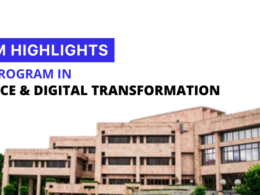If you’re gearing up for a data science interview in 2024, you’re in the right place!
Welcome to the era of data-driven decision-making, where the demand for skilled data scientists is higher than ever.
In this guide, we’ll walk you through the essential steps to prepare effectively and increase your chances of landing that dream data science role.
Understanding the Data Science Interview Process
In the fast-evolving field of data science, interviews can cover a broad spectrum of topics.
Familiarize yourself with the common themes to stay ahead.
Also read: What to expect in a Data Science Interview?
Steps in Data Science Hiring Process
The data science hiring process typically follows a structured set of steps to identify and select candidates with the right skills and qualifications.
Here’s an overview of the key stages in the data science hiring journey.
Table: Steps in Data Science Hiring Process
| Step | Description | Key Activities |
|---|---|---|
| 1. | Job Posting and Position Definition | Define the data science role, including responsibilities, required skills, and qualifications. Create a compelling job description and post it on relevant job boards and company career pages. |
| 2. | Resume Screening | Review resumes and applications to shortlist candidates based on their educational background, relevant experience, and skills. ATS (Applicant Tracking System) may be used for initial screenings. |
| 3. | Initial Screening Interview | Conduct a brief screening interview to assess the candidate’s overall fit for the role, communication skills, and basic technical knowledge. |
| 4. | Technical Assessment | Administer technical assessments, which may include coding challenges, problem-solving exercises, and data analysis tasks. Evaluate candidates’ proficiency in programming, statistical analysis, and machine learning concepts. |
| 5. | Case Study or Project Evaluation | Present candidates with a real-world case study or project to assess their ability to apply data science techniques to practical scenarios. Evaluate problem-solving skills, methodology, and communication of results. |
| 6. | Behavioral Interviews | Conduct behavioral interviews to evaluate candidates’ interpersonal skills, teamwork, and communication. Explore their experiences, decision-making processes, and ability to work in a collaborative environment. |
| 7. | Panel Interviews | Arrange interviews with a panel of stakeholders, including data scientists, team members, and managers. Evaluate candidates from multiple perspectives and gather diverse feedback. |
| 8. | Reference Checks | Contact provided references to verify candidates’ work history, skills, and performance. Gain insights into their past contributions and teamwork. |
| 9. | Offer and Negotiation | Extend a job offer to the selected candidate, including details on compensation, benefits, and other relevant terms. Negotiate terms if necessary and address any concerns. |
| 10. | Onboarding and Integration | Welcome the new hire and facilitate their onboarding process. Ensure a smooth transition into the team, providing necessary training and resources. |
Note: The hiring process may vary by organization, and some steps may be adjusted or combined based on the company’s specific requirements and preferences.

Key Topics in Data Science Interviews
1. Machine Learning Algorithms and Models
Ensure you have a solid understanding of popular algorithms such as linear regression, decision trees, and neural networks. Be ready to discuss their applications and when to use them.
Interview Questions:
- Can you explain the difference between supervised and unsupervised learning?
- How does a decision tree algorithm work, and what are its advantages and disadvantages?
2. Statistics and Probability
Brush up on fundamental statistical concepts like hypothesis testing, probability distributions, and regression analysis. Expect questions that assess your ability to interpret data.
Interview Questions:
- Explain the concept of p-value and its significance in hypothesis testing.
- What is the Central Limit Theorem, and why is it important in statistics?
3. Programming Proficiency
Demonstrate your coding skills, particularly in languages like Python and R. Practice coding challenges on platforms like LeetCode and HackerRank to enhance your problem-solving abilities.
Interview Questions:
- How would you implement a linear regression model in Python using a library like scikit-learn?
- Can you explain the difference between Python lists and NumPy arrays?
Tailoring Your Resume for Data Science Roles
Your resume is the first impression you make on potential employers. Optimize it to showcase your relevant skills and experiences.
Crafting a Data Scientist Resume
1. Keyword Optimization
Incorporate industry-relevant keywords like machine learning, data analysis, and statistical modeling. Many companies use applicant tracking systems (ATS), so tailoring your resume to match job descriptions is crucial.
Table: Essential Keywords for Data Science Resumes
| Machine Learning | Data Analysis | Statistical Modeling |
|---|---|---|
| Predictive Modeling | Data Visualization | Regression Analysis |
| Natural Language Processing | Exploratory Data Analysis |
Hypothesis Testing |
2. Highlighting Achievements
Quantify your achievements using metrics and numbers. Showcase projects where you applied data science techniques to solve real-world problems.
Interview Questions:
- Can you provide an example of a project where you applied machine learning to achieve a specific business outcome?
- How did you measure the success of your data-driven projects?
Mastering Technical Interviews in Data Science
Technical interviews are a crucial component of the hiring process. Prepare thoroughly for coding challenges and problem-solving scenarios.
Tips for Technical Interviews
1. Practice Coding Challenges
Use platforms like Kaggle, GitHub, and HackerRank to practice coding challenges. Familiarize yourself with common data science libraries like Pandas, NumPy, and Scikit-learn.
Table: Popular Coding Platforms for Data Science Practice
| Platform | Features |
|---|---|
| Kaggle | Real-world datasets, competitions |
| GitHub | Collaborative coding, version control |
| HackerRank | Coding challenges, interview preparation |
2. Case Study Analysis
Be ready to discuss and solve case studies that simulate real-world scenarios. Practice breaking down problems, outlining your approach, and communicating your thought process.
Interview Questions:
- How would you approach a data science problem when given a large dataset with missing values?
- Can you describe a situation where you had to make a decision based on incomplete or ambiguous data?

Nailing Behavioral Interviews in Data Science
In addition to technical skills, employers are interested in your ability to work in a team and communicate effectively.
Behavioral Interview Success
1. Communication Skills
Demonstrate your ability to explain complex concepts in a clear and concise manner. Practice discussing your past projects and experiences with a focus on outcomes.
Interview Questions:
- Explain a complex data science concept to a non-technical stakeholder. How do you ensure they understand the key points?
- Can you provide an example of a time when you had to convey a technical concept to a team member with limited data science knowledge?
2. Team Collaboration
Highlight instances where you successfully collaborated with cross-functional teams. Emphasize your adaptability and eagerness to learn from others.
Interview Questions:
- How do you ensure effective communication between data scientists and other departments within an organization?
- Can you share a challenging experience where you had to compromise or adjust your approach based on team feedback?
How to Prepare for Coding Challenges?
When preparing for the coding challenge in the technical round of a data science interview, it’s crucial to focus on four main question themes:
- Data manipulation
- Machine Learning Algorithms
- Statistics
- Data structures.
To excel in this phase, consider the following steps:
1. Study Foundational Concepts
Dive deep into the foundational concepts related to each of the four question themes. Understand the underlying principles and key techniques associated with data manipulation, machine learning algorithms, statistics, and data structures.
2. Practice Extensively
Sharpen your skills by working on a diverse range of problems for each theme. Start with simpler problems to build a strong foundation, and progressively challenge yourself with more complex scenarios. This practice will enhance your problem-solving abilities and boost your confidence.
3. Mock Interviews
Conduct practice interviews with a friend or a mentor. Simulate real interview conditions, focusing on answering questions related to data manipulation, machine learning algorithms, statistics, and data structures. Use online coding platforms that offer timed assessments to simulate the pressure of a real interview environment.
4. Online Coding Setups
Leverage online coding setups to practice with actual interview questions. These platforms provide a structured environment where you can solve coding challenges within a specified time frame. Use this opportunity to refine your coding skills, optimize your approach, and enhance your ability to think critically under time constraints.
Keeping Up with the Latest Trends in Data Science
The data science landscape is dynamic, with new technologies and methodologies emerging regularly.
Stay informed to show your commitment to ongoing learning.
Staying Current in Data Science
1. Continuous Learning
Subscribe to industry newsletters, follow influential blogs, data science resources and enroll in online courses to stay updated on the latest tools and techniques in data science.
Table: Recommended Online Platforms for Data Science Learning
| Platform | Features |
|---|---|
| Accredian | Specialized data science courses, certifications |
| Towards Data Science (Medium) | In-depth articles, tutorials |
| LinkedIn Learning | Video courses, expert-led content |
2. Networking
Connect with professionals in the field through platforms like LinkedIn and attend industry conferences. Networking can open doors to new opportunities and keep you informed about industry trends.
Interview Questions:
- How do you stay updated on the latest advancements in data science?
- Can you share an example of how networking has positively impacted your career in data science?

Tips for Data Science Virtual Interviews
Here are some essential tips to enhance your performance in virtual data science interviews:
1. Prioritize Internet Stability
Ensure a reliable and stable internet connection to avoid disruptions during the interview. This helps in maintaining smooth communication with the interviewer and prevents technical glitches.
2. Install Necessary Software
Before the interview, make sure you have all the required software installed and updated. This includes any tools or platforms that might be used for coding exercises or collaborative work.
3. Create a Professional Setup
Set up a clean and organized workspace for the interview. Ensure your background is tidy and professional, minimizing distractions. This creates a positive impression and allows the interviewer to focus on your skills and responses.
4. Verify Video Quality
Check your video settings and camera quality in advance. A clear and crisp video feed enhances your visibility and helps in establishing a professional connection with the interviewer.
5. Optimal Lighting Conditions
Pay attention to the lighting in your room. Natural, diffused lighting is ideal, and positioning yourself facing the light source can improve visibility. Avoid harsh shadows or backlighting that may obscure your face.
6. Microphone and Camera Check
Test your microphone and camera functionality well before the interview starts. Clear audio is crucial for effective communication, and a functional camera ensures the interviewer can see and engage with you properly.
Conclusion
As you prepare for your data science interview in 2024, remember that success is a combination of technical proficiency, effective communication, and a commitment to continuous learning.
By following this comprehensive guide, you’ll be well-equipped to tackle any challenge that comes your way. Best of luck in your data science journey!






